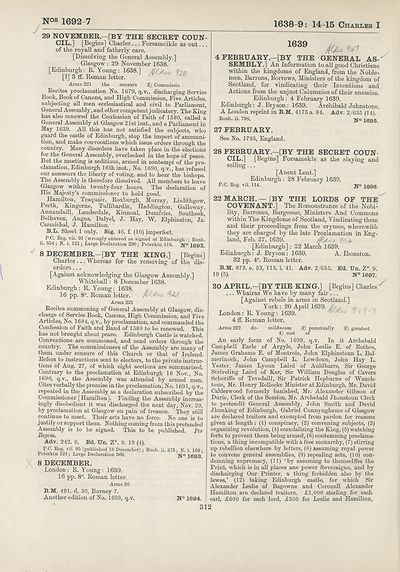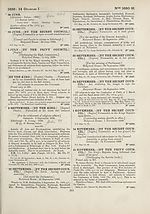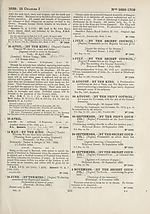Bibliography of royal proclamations of the Tudor and Stuart sovereigns and of others published under authority, 1485-1714 > Ireland -- Scotland
(324) Page 312
Download files
Complete book:
Individual page:
Thumbnail gallery: Grid view | List view

Nos 1692-7
1638-9: 14-15 Charles I
29 NOVEMBER—[BY THE SECRET COUN¬
CIL.] [Begins] Charles ... Forsameikle as out...
of the royall and fatherly care.
[Dissolving the General Assembly.]
Glasgow : 29 November 1638.
[Edinburgh: R. Young : 1638.] i^^:^ Q^q
[?] 3 flf. Roman letter. n^ ^ l^V
Arms 221 the censure 2) Commissio
Recites proclamation No. 1679, q.v., discharging Service
Book, Book of Canons, and High Commission, Five Articles,
subjecting all men ecclesiastical and civil to Parliament,
General Assembly, and other competent judicatory. The King
has also renewed the Confession of Faith of 1580, called a
General Assembly at Glasgow 21st inst., and a Parliament in
May 1639. All this has not satisfied the subjects, who
guard the castle of Edinburgh, stop the import of ammuni¬
tion, and make convocations which issue orders through the
country. Many disorders have taken place in the elections
for the General Assembly, overlooked in the hope of peace.
But the meeting is seditious, armed in contempt of the pro¬
clamation, Edinburgh 16th inst.. No. 1690, q.v., has refused
our assessors the liberty of voting, and to hear the bishops.
The Assembly is therefore dissolved. All members to leave
Glasgow within twenty-four hours. The declaration of
His Majesty's commissioner to hold good,
Hamilton, Traquair, Roxburgh, Murray, Linlithgow,
Perth, Kingorne, Tullibardin, Haddington, Galloway,
Annandaill, Lauderdale, Kinnoul, Dumfries, Southesk,
Belhaven, Angus, Dalyel, J. Hay, W. Elphinston, Ja.
Carmichal, J. Hamilton.
B.L. Sheet 1 only. Sig. 46. f. (10) imperfect.
P.C. Keg. vii. 91 (wrongly entered as signed at Edinburgh); Kusli.
u. 854 ; N. i. 121; Large Declaration 290 ; Peterkin 118. JJ-o 1692.
8 DECEMBER.-[BY THE KING.] [Begins]
Charles... Whereas for the removing of the dis¬
orders ...
[Against acknowledging the Glasgow Assembly.]
Whitehall: 8 December 1638.
Edinburgh: R. Young: 1638. ^
16 pp. 8°. Roman letter. flJi^tMi ^Jif
Arms 221
Recites summoning of General Assembly at Glasgow, dis¬
charge of Service Book, Canons, High Commission, and Five
Articles, No. 1684, q.v., by proclamation, and commanded the
Confession of Faith and Band of 1580 to be renewed. This
has not brought about peace. Edinburgh Castle is watched.
Conventions are summoned, and send orders through the
country. The commissioners of the Assembly are many of
them under censure of this Church or that of Ireland.
Refers to instructions sent to electors, to the private instruc¬
tions of Aug. 27, of which eight sections are summarized.
Contrary to the proclamation at Edinburgh 16 Nov., No.
1690, q.v., the Assembly was attended by armed men.
Cites verbally the promise in the proclamation. No. 1691, q.v.,
repeated in the Assembly as a declaration subscribed by the
Commissioner [Hamilton]. Finding the Assembly increas¬
ingly disobedient it was discharged the next day, Nov. 29,
by proclamation at Glasgow on pain of treason. They still
continue to meet. Their acts have no force. No one is to
justify or support them. Nothing coming from this pretended
Assembly is to be signed. This to be published. Fer
Jtegem.
Adv. 242. 6. Ed. Un. Z*. 9. 19 (4).
P.C. Reg. vii. 95 (published 18 December) ; Rush. ii. 875; N. i. 169 •
Peterkin 121; Large Declaration 366. j^o 1693'
8 DECEMBER.
London: R. Young: 1639.
16 pp. 8°. Roman letter.
Arms 26
B.M. 491. d. 30, Burney 7.
Another edition of No. 1693, q.v. N° 1694.
1639
^J^^ "^1^1
4 FEBRUARY.—[BY THE GENERAL AS¬
SEMBLY.] An Information to all good Christians
within the kingdome of England, from the Noble¬
men, Barrons, Borrows, Ministers of the kingdom of
Scotland, for vindicating their Intentions and
Actions from the unjust Calumnies of their enemies.
Edinburgh : 4 February 1639.
Edinburgh : J. Bryson : 1639. Archibald Johnstone.
A London reprint in B.M. 4175 a. 84. Adv. 2/635 (14),
Rush. ii. 798. jj-o ^69 5
27 FEBRUARY.
See No. 1795, England.
28 FEBRUARY.—[BY THE SECRET COUN¬
CIL.] [Begins] Forsamekle as the slaying and
selling...
[Anent Lent.]
Edinburgh : 28 February 1639.
P.C. Reg. vii. 114. -^o iqqq
/i- .u .--
a
y
22 MARCH. — [BY THE LORDS OP THE
COVENANT.] The Remonstrance of the Nobi¬
lity, Barrones, Burgesses, Ministers And Commons
within The Kingdome of Scotland, Vindicating them
and their proceedings from the crymes, wherewith
they are charged by the late Proclamation in Eng¬
land, Feb. 27. 1639. 4 J'j f5>
[Edinburgh] : 22 March 1639.
Edinburgh : J. Bryson : 1639. A. Ihonston.
32 pp. 4". Roman letter.
B.M. 873. e. 53, 113. i. 41. Adv. 2/635. Ed. Un. Z*. 9.
19 (5). N° 1697.
20 APRIL.-[BY THE KING.] _ [Begins] Charles
... Whairas We have by many fair . . .
[Against rebels in arms in Scotland.]
York: 20 April 1639.
London : R. Young : 1639.
4 fF. Roman letter.
Arms 222 de- mildnesse 2) punctually 3) greatest
4) cast of
An early form of No. 1699, q.v. In it Archebald
Campbell Earle of Argyle, John Leslie E. of Rothes,
James Grahame E. of Montrois, John Elphinstoun L. Bal-
merinoch, John Campbell L. Lowdoun, John Hay L.
Yester, James Lyoun Laird of Auldbarre, Sir George
Striveling Laird of Ker, Sir William Douglas of Cavers
Scheriffe of Tevedaill, Sir Patrick Hepburne of Wauch-
toun, Mr. Henry Rollocke Minister at Edinburgh, Mr. David
Calderwood formerly banished, Mr. Alexander Gibson of
Durie, Clerk of the Session, Mr. Archebald Jhonstoun Clerk
to pretendit General Assembly, John Smith and David
Jhonking of Edinburgh, Gabriel Cunnynghame of Glasgow
are declared traitors and exempted from pardon for reasons
given at length : (1) conspiracy, (2) convening subjects, (3)
organizing revolution, (4) scandalizing the King, (5) watching
forts to prevent them being armed, (6) contemning proclama¬
tions, a thing incompatible with a free monarchy, (7) stirring
up rebellion elsewhere by letters, (8) assuming royal power
to convene general assemblies, (9) repealing acts, (10) con¬
demning supremacy, (11) 'by assuming to themselffes the
Print, which is in all places ane power Soveraigne, and by
dischairging Our Printer, a thing forbidden also by the
lawes,' (12) taking Edinburgh castle, for which Sir
Alexander Leslie of Bagowne and Coronell Alexander
Hamilton are declared traitors. £1,000 sterling for each
earl, £600 for each lord, £500 for Leslie and Hamilton,
^
y
312
1638-9: 14-15 Charles I
29 NOVEMBER—[BY THE SECRET COUN¬
CIL.] [Begins] Charles ... Forsameikle as out...
of the royall and fatherly care.
[Dissolving the General Assembly.]
Glasgow : 29 November 1638.
[Edinburgh: R. Young : 1638.] i^^:^ Q^q
[?] 3 flf. Roman letter. n^ ^ l^V
Arms 221 the censure 2) Commissio
Recites proclamation No. 1679, q.v., discharging Service
Book, Book of Canons, and High Commission, Five Articles,
subjecting all men ecclesiastical and civil to Parliament,
General Assembly, and other competent judicatory. The King
has also renewed the Confession of Faith of 1580, called a
General Assembly at Glasgow 21st inst., and a Parliament in
May 1639. All this has not satisfied the subjects, who
guard the castle of Edinburgh, stop the import of ammuni¬
tion, and make convocations which issue orders through the
country. Many disorders have taken place in the elections
for the General Assembly, overlooked in the hope of peace.
But the meeting is seditious, armed in contempt of the pro¬
clamation, Edinburgh 16th inst.. No. 1690, q.v., has refused
our assessors the liberty of voting, and to hear the bishops.
The Assembly is therefore dissolved. All members to leave
Glasgow within twenty-four hours. The declaration of
His Majesty's commissioner to hold good,
Hamilton, Traquair, Roxburgh, Murray, Linlithgow,
Perth, Kingorne, Tullibardin, Haddington, Galloway,
Annandaill, Lauderdale, Kinnoul, Dumfries, Southesk,
Belhaven, Angus, Dalyel, J. Hay, W. Elphinston, Ja.
Carmichal, J. Hamilton.
B.L. Sheet 1 only. Sig. 46. f. (10) imperfect.
P.C. Keg. vii. 91 (wrongly entered as signed at Edinburgh); Kusli.
u. 854 ; N. i. 121; Large Declaration 290 ; Peterkin 118. JJ-o 1692.
8 DECEMBER.-[BY THE KING.] [Begins]
Charles... Whereas for the removing of the dis¬
orders ...
[Against acknowledging the Glasgow Assembly.]
Whitehall: 8 December 1638.
Edinburgh: R. Young: 1638. ^
16 pp. 8°. Roman letter. flJi^tMi ^Jif
Arms 221
Recites summoning of General Assembly at Glasgow, dis¬
charge of Service Book, Canons, High Commission, and Five
Articles, No. 1684, q.v., by proclamation, and commanded the
Confession of Faith and Band of 1580 to be renewed. This
has not brought about peace. Edinburgh Castle is watched.
Conventions are summoned, and send orders through the
country. The commissioners of the Assembly are many of
them under censure of this Church or that of Ireland.
Refers to instructions sent to electors, to the private instruc¬
tions of Aug. 27, of which eight sections are summarized.
Contrary to the proclamation at Edinburgh 16 Nov., No.
1690, q.v., the Assembly was attended by armed men.
Cites verbally the promise in the proclamation. No. 1691, q.v.,
repeated in the Assembly as a declaration subscribed by the
Commissioner [Hamilton]. Finding the Assembly increas¬
ingly disobedient it was discharged the next day, Nov. 29,
by proclamation at Glasgow on pain of treason. They still
continue to meet. Their acts have no force. No one is to
justify or support them. Nothing coming from this pretended
Assembly is to be signed. This to be published. Fer
Jtegem.
Adv. 242. 6. Ed. Un. Z*. 9. 19 (4).
P.C. Reg. vii. 95 (published 18 December) ; Rush. ii. 875; N. i. 169 •
Peterkin 121; Large Declaration 366. j^o 1693'
8 DECEMBER.
London: R. Young: 1639.
16 pp. 8°. Roman letter.
Arms 26
B.M. 491. d. 30, Burney 7.
Another edition of No. 1693, q.v. N° 1694.
1639
^J^^ "^1^1
4 FEBRUARY.—[BY THE GENERAL AS¬
SEMBLY.] An Information to all good Christians
within the kingdome of England, from the Noble¬
men, Barrons, Borrows, Ministers of the kingdom of
Scotland, for vindicating their Intentions and
Actions from the unjust Calumnies of their enemies.
Edinburgh : 4 February 1639.
Edinburgh : J. Bryson : 1639. Archibald Johnstone.
A London reprint in B.M. 4175 a. 84. Adv. 2/635 (14),
Rush. ii. 798. jj-o ^69 5
27 FEBRUARY.
See No. 1795, England.
28 FEBRUARY.—[BY THE SECRET COUN¬
CIL.] [Begins] Forsamekle as the slaying and
selling...
[Anent Lent.]
Edinburgh : 28 February 1639.
P.C. Reg. vii. 114. -^o iqqq
/i- .u .--
a
y
22 MARCH. — [BY THE LORDS OP THE
COVENANT.] The Remonstrance of the Nobi¬
lity, Barrones, Burgesses, Ministers And Commons
within The Kingdome of Scotland, Vindicating them
and their proceedings from the crymes, wherewith
they are charged by the late Proclamation in Eng¬
land, Feb. 27. 1639. 4 J'j f5>
[Edinburgh] : 22 March 1639.
Edinburgh : J. Bryson : 1639. A. Ihonston.
32 pp. 4". Roman letter.
B.M. 873. e. 53, 113. i. 41. Adv. 2/635. Ed. Un. Z*. 9.
19 (5). N° 1697.
20 APRIL.-[BY THE KING.] _ [Begins] Charles
... Whairas We have by many fair . . .
[Against rebels in arms in Scotland.]
York: 20 April 1639.
London : R. Young : 1639.
4 fF. Roman letter.
Arms 222 de- mildnesse 2) punctually 3) greatest
4) cast of
An early form of No. 1699, q.v. In it Archebald
Campbell Earle of Argyle, John Leslie E. of Rothes,
James Grahame E. of Montrois, John Elphinstoun L. Bal-
merinoch, John Campbell L. Lowdoun, John Hay L.
Yester, James Lyoun Laird of Auldbarre, Sir George
Striveling Laird of Ker, Sir William Douglas of Cavers
Scheriffe of Tevedaill, Sir Patrick Hepburne of Wauch-
toun, Mr. Henry Rollocke Minister at Edinburgh, Mr. David
Calderwood formerly banished, Mr. Alexander Gibson of
Durie, Clerk of the Session, Mr. Archebald Jhonstoun Clerk
to pretendit General Assembly, John Smith and David
Jhonking of Edinburgh, Gabriel Cunnynghame of Glasgow
are declared traitors and exempted from pardon for reasons
given at length : (1) conspiracy, (2) convening subjects, (3)
organizing revolution, (4) scandalizing the King, (5) watching
forts to prevent them being armed, (6) contemning proclama¬
tions, a thing incompatible with a free monarchy, (7) stirring
up rebellion elsewhere by letters, (8) assuming royal power
to convene general assemblies, (9) repealing acts, (10) con¬
demning supremacy, (11) 'by assuming to themselffes the
Print, which is in all places ane power Soveraigne, and by
dischairging Our Printer, a thing forbidden also by the
lawes,' (12) taking Edinburgh castle, for which Sir
Alexander Leslie of Bagowne and Coronell Alexander
Hamilton are declared traitors. £1,000 sterling for each
earl, £600 for each lord, £500 for Leslie and Hamilton,
^
y
312
Set display mode to: Large image | Transcription
Images and transcriptions on this page, including medium image downloads, may be used under the Creative Commons Attribution 4.0 International Licence unless otherwise stated. ![]()
| Permanent URL | https://digital.nls.uk/105791305 |
|---|
| Attribution and copyright: |
|
|---|---|
| Description | Privately printed catalogues of the special collections of the Bibliotheca Lindesiana, the family library of the Earls of Crawford and Balcarres. Reformation Tracts, English Newspapers and De Bry Collection catalogues provide the only record of the contents of these collections. Also include catalogues of Bibliotheca Lindesiana collections now held elsewhere. |
|---|

